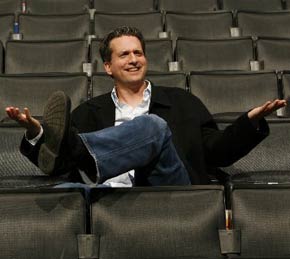The balance of power between ESPN’s business interests and their journalistic interests is the most important tightrope walked every day in sports media. Whenever the two collide, it leads to serious questions of whether or not ESPN can fairly and justly balance their own version of the separation of church and state.
The three week suspension of Bill Simmons is another episode where those interests collide thanks to The Sports Guy calling NFL commish Roger Goodell a liar. He also publicly challenged ESPN to discipline him for the comment, which they obliged in doing.
The polarizing suspension has certainly made waves both inside and outside Bristol with many in firm disagreement with ESPN for silencing their top personality. Few thoughts have been made public by anyone even remotely connected to ESPN, but the most interesting opinion to arise comes from filmmaker and Grantland contributor Brian Koppelman.
On his personal website, Koppelman has written a very interesting piece bringing up his own past with ESPN and how the business interests and relationships with the NCAA and sports leagues has an impact on the editorial side.
Specifically, he says ESPN cancelled a planned original drama series on an NCAA team fixing a college football game because of television rights negotiations with the organization…
I have a ton of empathy for Bill Simmons right now because I too was once sacrificed at the alter of ESPN’s broadcast partners. This was about ten years back. My creative partner, David Levien, and I got a call from a producer who said he had an idea for a series that ESPN loved, if only they could find someone to really figure out the story and write it.
The show was to be a drama called The Fix that would be set at an NCAA division one school; the story of the season would be how and why a college football game would be fixed.
Levien and I went up to ESPN and had a terrific meeting. They loved our take on the idea and wanted to hire us to be the creators and executive producers. It was at this point, that we asked the question: “but guys,” we said, “are you ever really going to be able to put a show like this on the air?”
The head of programming (who’s no longer there) turned to the room and said: “if you guys write the pilot you are talking about writing, we will green light the season.”
“But what about the NCAA?”
“Don’t worry about it.”
Being young(ish) and fascinated by the premise, we agreed to write the pilot. We turned it in, the head of programming called us. “I love it. You delivered. We are going to make it. Come to the office tomorrow so we can officially do this, but go to sleep tonight knowing you are going to be running a show for me.”
Next day, we head back up to ESPN. But the faces we see ringing the conference table are far from buoyant. We know before the Head of Programming even begins speaking.
“Can’t green light the show, fellas. NCAA negotiations are coming up.”
[…]
When Simmons got suspended this past week, I immediately flashed back to The Fix. He made the same mistake we and the head of programming did. He forgot that ESPN will never really bite the hand that feeds it.
The rest of the blog post on Simmons’ suspension and ESPN’s journalistic integrity provides rare, valuable insights from someone who has been on the inside. Many will say that ESPN’s business relationships don’t affect its day to day coverage. Several investigative journalists and reporters have held firm in that regard. However, in the corner offices, a much different picture has always been painted when it comes to the corporate suits who are really challenged with balancing the interests of ESPN and its business partners. When it comes to important decisions as a network, ESPN’s record in that task is complicated. The Simmons suspension and these revelations just adds to it.









Comments are closed.